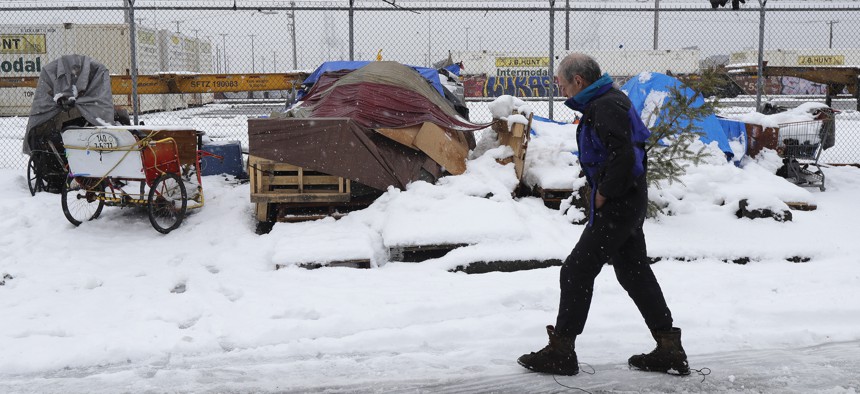In a First, Seattle City Council Moves to Ban Winter Evictions

Kevin Shepherd, who lives in a tent in Seattle, said keeping warm is the hardest task in winter. Supporters of the eviction moratorium bill said that the measure is necessary to prevent more people from ending up in the street during cold months. Ted S. Warren/AP Photo
If the measure is signed by Mayor Jenny Durkan, the city would prohibit evictions of low- and moderate-income renters during the coldest months.
Landlords in Seattle would no longer be allowed to evict low- and moderate-income renters during the winter under a measure approved by the city council this week. If the legislation becomes law, Seattle will be the first city in the country to ban evictions during certain months of the year.
The legislation argues that prohibiting evictions from December 1 to March 1 keeps people safe by reducing the number of people becoming homeless during the cold winter months.
Councilmember Kshama Sawant brought the proposal to the council and other members made several changes before passing it. Those amendments included shortening the eviction moratorium period from five months to three, exempting landlords with four or fewer units, and limiting the ban to only low- and moderate-income tenants. Still, when the bill passed, Sawant heralded it as “huge.”
“At the end of the day, what we have is landmark legislation that has no precedent in the country,” Sawant said in the council meeting.
The legislation makes mention of a 2018 report called Losing Home, compiled by the King County Bar Association and the Seattle Women’s Commission. The report, which studied 1,218 eviction proceedings in 2017, found that women and people of color were disproportionately overrepresented.
The overwhelming majority of evictions—86.5%—were for nonpayment of rent. Of those, 52.3% were for one month’s rent or less. Over half of those in eviction proceedings said that the loss of a job resulted in their inability to pay. Most people who were eventually evicted reported becoming homeless, with 37.5% completely unsheltered, 25% living in a homeless shelter or transitional housing and 25% staying with family or friends. Only 12.5% of evicted tenants found another place to live.
The measure in Seattle now heads to Mayor Jenny Durkan, who is evaluating the bill and has not yet made a decision about her position. “City Council and the mayor share the same goal: helping people facing evictions and keeping them in their homes, especially during the winter months,” Ernesto Apreza, a spokesperson for Durkan, said in a statement. “But the mayor has been advised a legal fight is almost certain and could be costly to taxpayers.”
Durkan could approve the measure, let it become law without her signature or veto it. If she vetoes, the council can vote to override her with six council members in support. Seven members of the City Council voted for the bill on Monday, with two members absent.
Supporters of the winter eviction moratorium said that the measure is needed to prevent people from dying on the streets. “Passing such a moratorium will keep neighbors from being displaced to the streets during the months with the harshest weather and poorest living conditions for neighbors living unsheltered,” reads a letter sent to the council by the Seattle Renters' Commission.
In 2018, the King County Medical Examiner’s Office investigated the deaths of 194 homeless people. The office concluded some succumbed to exposure-related ailments.
Seattle is not the first locality to ban evictions out of fear for tenant safety, but it has gone further than others. Some jurisdictions, like Washington, D.C., and Montgomery County, Maryland, ban evictions when the temperature drops below freezing, or if it is raining or snowing.
The bill faced opposition from housing industry groups like the Rental Housing Association of Washington. Kyle Woodring, director of government affairs for the RHAW, expressed disappointment with the council’s vote. “We would have liked to see the Council pass legislation that would build on the success of rental assistance programs to assist the small number of vulnerable residents who are at risk of eviction,” Woodring said. “Instead, we have another onerous law that doesn’t help solve our housing situation and makes it even harder to rent an affordable apartment in the City.”
The RHAW and other landlord advocacy groups said that the city would be better off investing in tenant protection funds that help families at imminent risk of eviction. In 2018, the Seattle Housing Levy, a tax that helps fund affordable housing and efforts to reduce homelessness, provided 553 families with an average of $1,686 to prevent evictions. A year after receiving those funds, 95% of those families were still housed.
It’s possible that Seattle’s proposed ban will now pit city officials against the state government. Legislation currently under consideration in the Washington state Senate would bar localities from instituting eviction bans like the one passed by the city council.
Emma Coleman is the assistant editor for Route Fifty.
NEXT STORY: Ushering in A New Era of Firefighting






